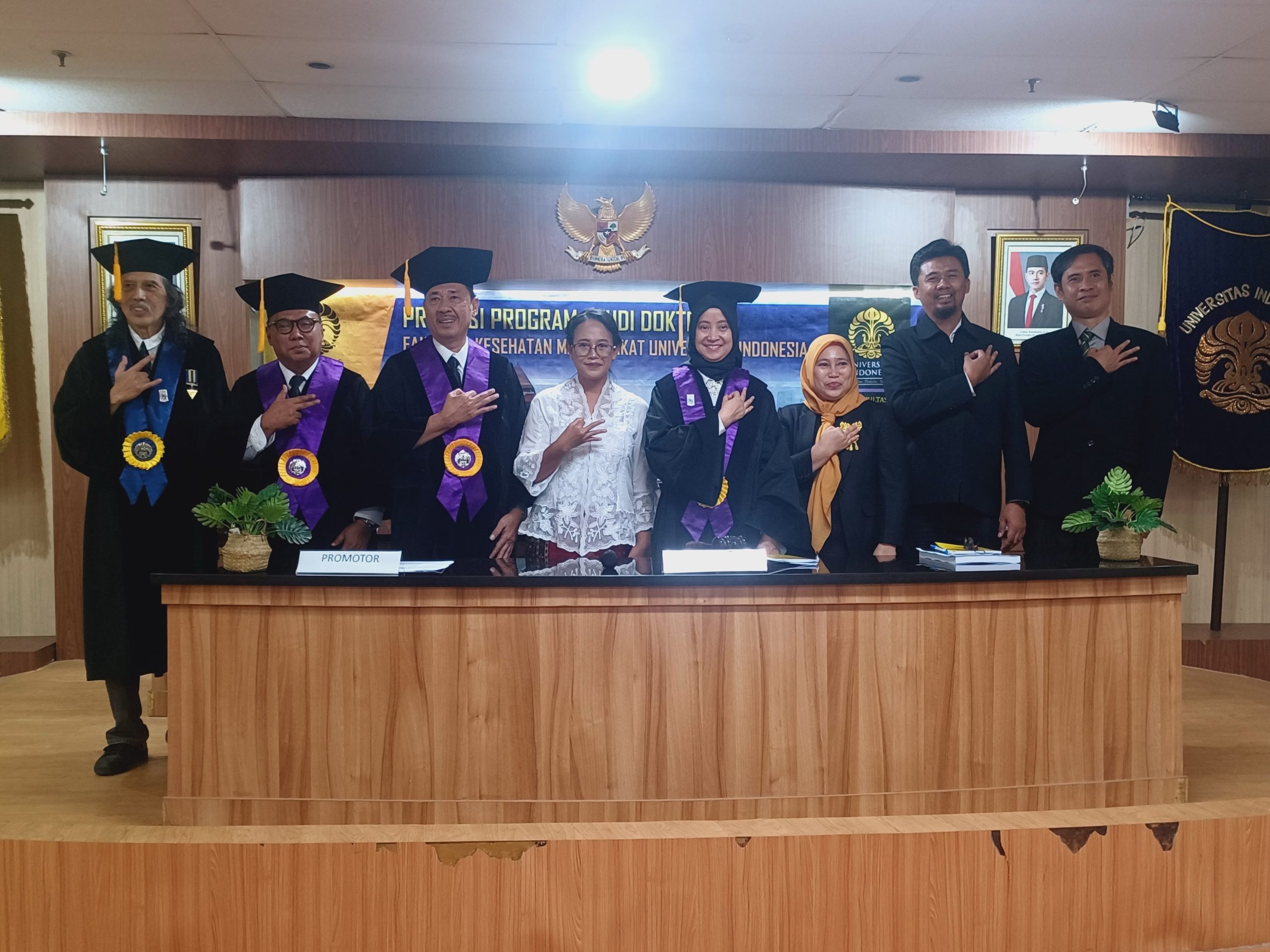The Faculty of Public Health (FPH) at Universitas Indonesia (UI) has once again produced a doctoral graduate in the field of Public Health Sciences (Ilmu Kesehatan Masyarakat/IKM), contributing strategically to occupational safety in high-risk industries. Doctoral candidate Putu Nadi Astuti successfully defended her dissertation titled “Development of a Safety Culture Maturity Model for the Petrochemical Industry in Indonesia.” The open defense was held in a hybrid format on June 30, 2025, at the Doctoral Defense Room in Building G, FPH UI, and via Zoom Meetings. The session was chaired by Prof. dra. Fatma Lestari, M.Si., Ph.D., as Head of the Examination Committee.
Putu Nadi Astuti’s dissertation stems from the critical need for occupational safety in the petrochemical sector—a high-risk industry marked by complex risks, system interdependencies, and the presence of hazardous substances under extreme temperatures and pressures. Accidents in this sector can cause significant economic loss and threaten lives. Over the past three decades, safety culture has been recognized as a crucial element in safety management systems, alongside technical and structural aspects.
Safety culture is not only a key indicator of management system quality but is also often identified as a root cause of major industrial incidents. Putu identified the need for a specific and adaptive framework tailored to Indonesia’s petrochemical sector to assess and enhance safety culture maturity. She developed a maturity model inspired by the theories of Hudson, Fleming, Parker et al., and Filho.
Her model outlines five levels of safety culture maturity: Basic, Reactive, Proactive, Integrated, and Sustainable. Each level reflects how well an organization understands, manages, and embeds safety values across its operational processes. “The model assesses five key dimensions: management commitment, safety communication, reporting and information systems, employee engagement, and organizational learning. Using both quantitative and qualitative methods, this instrument accurately maps the actual state of a company’s safety culture,” Putu explained.
Her findings indicate that most petrochemical companies surveyed had achieved a “sustainable” level of maturity, especially in the areas of commitment and organizational learning. “This shows that these companies have established stable safety systems with a focus on continuous improvement,” she said. However, the dimensions of communication and employee engagement were relatively weaker, highlighting the need for strengthened participatory practices. Another notable finding was that safety managers had a far more mature understanding of safety culture than field workers, indicating an internal gap in safety perceptions and practices.
Putu emphasized that her model is highly applicable as a self-assessment tool for companies to evaluate their safety culture positioning. More than just a measurement tool, the model also encourages sustainable cultural transformation. She recommended that petrochemical companies adopt the model as a foundation for internal policy formulation, training program alignment, and periodic evaluations of safety system effectiveness. “Enhancing worker participation in safety-related decision-making is crucial so that safety values are not just upheld by management but become part of the organization’s collective culture,” she added.
She also made several recommendations to the government—especially the Ministry of Industry and the Ministry of Manpower—to strengthen the state’s role in fostering and overseeing safety culture within the petrochemical sector. She proposed that the current Process Safety Management System (SMKP) be reviewed and aligned with international standards. Furthermore, she encouraged the government to develop regulations specifically addressing safety culture, beyond just technical occupational safety. “In addition to stricter oversight, the government should also launch widespread safety culture campaigns targeting workers at the grassroots level, such as through the annual National OHS Month (Bulan K3 Nasional),” said Putu. These campaigns could highlight the importance of open communication, learning from incidents, and encouraging the reporting of unsafe conditions without fear of punishment.
Her dissertation research earned Putu the Doctoral degree with cum laude honors and a cumulative GPA of 3.89. She became the 17th doctoral graduate of the FPH UI’s Doctoral Program in Public Health Sciences in 2025, the 356th Doctor of IKM, and the 467th doctoral graduate of FPH UI overall.
During her dissertation, Putu was mentored by Promoter Prof. Dr. dr. Zulkifli Djunaidi, M.App.Sc., and Co-Promoter Prof. Dr. Drs. Sutanto Priyo Hastono, M.Kes. The examination committee included Prof. Dr. Ir. Johny Wahyuadi Mudaryoto, DEA; Dr. Lana Saria, S.Si., M.Si.; Dr. Herlina J. EL-Maturi, S.T., M.Kes.; Dr. Ayende, S.T., M.K.K.K.; and Dr. Ridha Renaldi, S.T., M.M., who provided critical and constructive feedback for the development of the model.
This academic contribution is further reinforced by Putu Nadi Astuti’s strategic role in policymaking. She currently serves as the Director of Cement, Ceramics, and Non-Metallic Mineral Processing Industries at the Ministry of Industry of the Republic of Indonesia. Her combination of academic capacity and bureaucratic leadership positions her research to be directly implemented into national industrial policy. She exemplifies how doctoral research can transcend academia and directly support public policy needs and national industrial transformation.
Putu Nadi Astuti’s achievement not only adds to Indonesia’s growing pool of top-tier academics but also strengthens FPH UI’s reputation as a higher education institution capable of producing leaders who make tangible contributions to national development. Through the integration of high-quality research and policy recommendations, FPH UI remains committed to bridging academia and industry in advancing a more progressive, cultured, and sustainable occupational safety system in Indonesia. (DFD)

